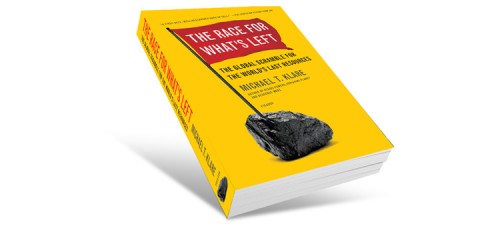
The Pentagon’s Spoiling for a Fight -- But With China, Not Iran
Michael Klare
The recent White House decision to speed the deployment of an aircraft carrier battle group and other military assets to the Persian Gulf has led many in Washington and elsewhere to assume that the U.S. is gearing up for war with Iran. As in the lead-up to the 2003 invasion of Iraq, U.S. officials have cited suspect intelligence data to justify elaborate war preparations. On May 13th, acting Secretary of Defense Patrick Shanahan even presented top White House officials with plans to send as many as 120,000 troops to the Middle East for possible future combat with Iran and its proxies. Later reports indicated that the Pentagon might be making plans to send even more soldiers than that. Hawks in the White House, led by National Security Advisor John Bolton, see a war aimed at eliminating Iran’s clerical leadership as a potentially big win for Washington. Many top officials in […]

It’s Already Under Way
Michael Klare
In his highly acclaimed 2017 book, Destined for War, Harvard professor Graham Allison assessed the likelihood that the United States and China would one day find themselves at war. Comparing the U.S.-Chinese relationship to great-power rivalries all the way back to the Peloponnesian War of the fifth century BC, he concluded that the future risk of a conflagration was substantial. Like much current analysis of U.S.-Chinese relations, however, he missed a crucial point: for all intents and purposes, the United States and China are already at war with one another. Even if their present slow-burn conflict may not produce the immediate devastation of a conventional hot war, its long-term consequences could prove no less dire.

Artificial Intelligence and the Future of War
Michael Klare
There could be no more consequential decision than launching atomic weapons and possibly triggering a nuclear holocaust. President John F. Kennedy faced just such a moment during the Cuban Missile Crisis of 1962 and, after envisioning the catastrophic outcome of a U.S.-Soviet nuclear exchange, he came to the conclusion that the atomic powers should impose tough barriers on the precipitous use of such weaponry. Among the measures he and other global leaders adopted were guidelines requiring that senior officials, not just military personnel, have a role in any nuclear-launch decision. That was then, of course, and this is now. And what a now it is! With artificial intelligence, or AI, soon to play an ever-increasing role in military affairs, as in virtually everything else in our lives, the role of humans, even in nuclear decision-making, is likely to be progressively diminished. In fact, in some future AI-saturated world, it could […]

The Pentagon’s Provocative Encirclement of China
Michael Klare
On May 30th, Secretary of Defense James Mattis announced a momentous shift in American global strategic policy. From now on, he decreed, the U.S. Pacific Command (PACOM), which oversees all U.S. military forces in Asia, will be called the Indo-Pacific Command (INDOPACOM). The name change, Mattis explained, reflects “the increasing connectivity between the Indian and Pacific Oceans,” as well as Washington’s determination to remain the dominant power in both. What? You didn’t hear about this anywhere? And even now, you’re not exactly blown away, right? Well, such a name change may not sound like much, but someday you may look back and realize that it couldn’t have been more consequential or ominous. Think of it as a signal that the U.S. military is already setting the stage for an eventual confrontation with China. If, until now, you hadn’t read about Mattis’s decision anywhere, I’m not surprised since the media […]
